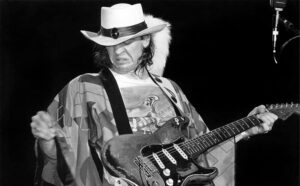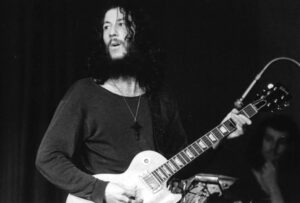It is difficult to think of an album that has had a greater influence on the blues than Robert Johnson’s King Of The Delta Blues Singers.
In fact, I would argue that it is one of the most significant albums ever recorded.
The album had a profound impact on musicians like Keith Richards, Peter Green and Eric Clapton, amongst countless others.
As such, it played a critical role in the British blues movement of the 1960s. This in turn made blues music popular amongst white audiences for the first time.
Musicians like B.B. King and Muddy Waters – who had previously spent most of their careers playing in smaller bars and clubs – were given new opportunities.
The British blues boom also led to the creation of heavier forms of rock music, which totally changed the landscape of music as we now know it.
Whilst it would be tenuous to attribute all of this to Robert Johnson and King of The Delta Blues Singers, there are strong and obvious links between this album and the explosion of blues and blues rock in the 1960s.
As Eric Clapton observed, when talking about Johnson’s album:
After a few listenings, I realised that on some level, I had found the master, and that following this man’s example would be my life’s work
In this article then, I will be looking at Robert Johnson and his unusual personal history, as well as the myths and legends that surround the creation of the King Of The Delta Blues Singers.
I will also run through some of the standout tracks, and the reasons that this album absolutely needs to be in your blues record collection.
Robert Johnson
The story of Robert Johnson is one of the most compelling and mysterious in music history.
Johnson was born in Hazelhurst, Mississippi, in May 1911.
His mother – Julie Dodds – had previously been married to a wealthy landowner and furniture maker named Charles Dodds.
Dodds however was chased out of town by a lynch mob after he became enthralled in a dispute with a local white landowner.
Johnson’s mother was left alone and destitute, and she took up with a local lumber camp worker called Noah Johnson. Noah would become Robert Johnson’s biological father.
Growing up, Robert Johnson spent a lot of time moving between different towns. This was until his mother remarried a sharecropper called Will Willis around 1919.
Willis and Johnson had a turbulent relationship. Johnson refused to work in the fields like his step-father, and received regular beatings for his disobedience.
This was to be the first in a long series of hardships that Johnson endured during his lifetime.
When he was just 19, Johnson’s first wife and child both died during childbirth.
Some years later when he fell in love and had a child with another woman called Virgie Cain, Cain’s grandparents prevented Johnson from seeing both Virgie and his child.
Struggling to cope with these hardships, Johnson turned to a life of hard drinking and womanising. It was a lifestyle that would ultimately be his downfall.
In 1938, Johnson died after he was allegedly poisoned by the husband of a woman with whom he was having an affair. He was just 27 years old.
This gives him the dubious title of the earliest member of the ’27 Club’ – the list of famous musicians, artists and actors who all died at age 27.
The devil’s music
Far from being treated with compassion for the various tragedies that plagued his life, Johnson was in fact blamed for them.
When Johnson was alive, to play the blues was to play the ‘devil’s music’. So to choose the life of a travelling blues musician – as Johnson did – was to commit yourself to a life of sin.
Thus Johnson was blamed for the death of his wife and child, and later prevented from seeing his son Claud.
As Claud once recalled when talking about his grandparent’s reaction to Johnson appearing at their home:
They said he was working for the devil, and they wouldn’t even let me go out and touch him, I stood in the door, and he stood on the ground, and that is as close as I ever got to him.… I never saw him again
Johnson was certainly not alone in his association with the devil.
The whole genre of the blues was frowned upon as the work of Satan. Yet it is Johnson who is famously remembered as having sold his soul to the Devil.
So the story goes, he travelled to a crossroads in Clarksdale, Mississippi in the middle of the night. He met the Devil, who tuned his guitar and handed it back to him.
The Devil took Johnson’s soul and in turn gifted him with virtuosic guitar playing and song writing abilities.
Cross Road Blues
That this story remains such a significant part of Robert Johnson’s legacy is two-fold.
Firstly, there was the rapid transformation in Johnson’s musical ability.
At the beginning of his career, Johnson would regularly turn up at the gigs of Son House and Willie Brown to watch them perform.
During breaks in the set, he would try and play their guitars, much to the annoyance of the audience. As Son House once recalled:
Every time we stopped to rest and set that ol’ guitar over in the corner or something, he trying to play it and be just noising the people you know. And the folks, they’d come out, say “Why don’t some of y’all go down and make that boy put that thing down, he running us crazy
After one such instance, and with his ego bruised, Johnson disappeared.
He left the Mississippi Delta for a year, and to this day, no-one knows where he went. When he returned to Mississippi a year later, he was transformed.
He turned up at a Son House and Willie Brown gig and convinced them to let him play. This time though, he had an altogether different effect on the audience.
As Professor Karlos Hill has observed – ‘One moment, Johnson is a mediocre to bad guitar player. A year and a half later, he’s an impresario. He’s doing things with the guitar that even his mentors can’t do’.
This transformation played a large part in the creation of the myth that Johnson sold his soul at the crossroads. People could just not believe that he advanced so quickly.
Even to this day, Johnson’s technical ability is very highly regarded.
As Eric Clapton wrote in his autobiography about trying to imitate Johnson as a teenager:
I tried to copy Johnson, but his style of simultaneously playing a disjointed bass line on the low strings, rhythm on the middle strings and lead on the treble strings while singing at the same time, was impossible to even imagine.
Clapton is not alone in his admiration of Johnson’s technical prowess.
Bluesman Walter Trout stated that Johnson’s style of playing makes him sound ‘like three guys, because he’s playing a bass line, a rhythm and slide leads, all at the same time’.
Keith Richards upon first hearting Johnson, proclaimed, ‘This guy must have three brains!’
Robert Johnson & ‘Hoodoo’ magic
The second, significant factor that has strengthened Johnson’s association with the Devil, is the frequency with which he refers to the Devil in his work.
In The King Of The Delta Blues Singers, for example, Johnson makes frequent and overt references the Devil.
‘Preachin’ Blues (Up Jumped the Devil)’, ‘Me and the Devil Blues’ and ‘Hell Hound On My Trail’ are just 3 examples of songs where Johnson links himself to Satan.
In addition, Johnson makes repeated references throughout his music to ‘Hoodoo’ – a type of spiritual practice that was created in America by enslaved Africans.
One such reference appears in the song ‘Come On In My Kitchen‘ when Johnson sings: ‘Oh, she’s gone, I know she won’t come back / I’ve taken the last nickel out of her nation sack.’
The ‘nation sack’ was a bag that women practicing Hoodoo used to wear on a belt around their waist. It gave them sexual power and control over men.
So by removing the contents of his partner’s nation sack, Johnson is free from the power of the Hoodoo, and can invite whoever he wants into his kitchen.
Significantly, the story of Johnson going to the crossroads also has its origins in Hoodoo. As Professor Yvonne Chireau has observed:
Hoodoo has these stories of people going down to a crossroad and meeting up with an entity who offers some sort of insight or knowledge…So Hoodoo was seen as a way of gaining control, in a world that was suffused with violence and limited options
This last point is interesting.
In fact it gives rise to a whole other interpretation of the lyrics in Johnson’s music.
For some scholars have argued that Johnson is not talking about the Devil at all. In fact he is talking about racial violence and oppression.
Hell Hound & the blues
One of the strongest references to racial violence comes in Johnson’s famous song, ‘Hell Hound On My Trail’. Here Johnson sings about sprinkling ‘hot foot powder at his door’.
As Professor Karlos Hill points out:
African Americans refer to ‘hot powder’ as a means to evade bloodhounds. That would have been used by someone fleeing a lynch mob… So I think that expresses the psychological torment of feeling like lynching is always around the corner, it’s always a possibility, you are never safe
In this way then, we can look at the Devil in Johnson’s songs not as Satan himself, but as an embodiment of the brutality to which African Americans were subjected.
In his assessment of Johnson’s work, Eric Clapton has extended this idea even further. Clapton doesn’t believe that Johnson is singing about the Devil.
As he once stated – ‘I began thinking of it as a metaphor for trouble. I believe in the presence of evil….And I think that’s what he was going after’.
It is partly this ambiguity which makes Robert Johnson’s work so interesting.
Is he singing about the Faustian pact he made with the Devil? Is he using the Devil as a metaphor for racial oppression and violence?
Or is he merely confronting the troubles and challenges that we all face when we experience love, loss and hardship?
These are questions that will never be answered.
Yet whilst we may never know the true source of Johnson’s anguish, The King Of The Delta Blues Singers perfectly captures his pain and suffering.
Returning again to Clapton: ‘When I first listened to (Johnson) I was completely overwhelmed by his vulnerability. What struck me more than anything else was how in touch with his feelings he was.’
Recording Robert Johnson
Interestingly, the intense music that Clapton first heard as a teenager was at odds with most of the music that Robert Johnson actually played during his lifetime.
Contemporaries of Johnson and the musicians that played with him noted that during live performances, he rarely played his own songs. Instead he played the popular songs of the day.
This gave Johnson both an income, and a reputation as a brilliant entertainer. However he was left wanting more.
So in 1936 he connected with a local talent scout, who arranged for him to record his own compositions. Johnson travelled to San Antonio, and recorded 16 songs over 3 days.
Reportedly Johnson recorded facing the corner of the room. This has since caused a lot of speculation amongst historians and musicologists.
Some believed this to be proof that Johnson was a shy and retiring man. Others asserted that Johnson was trying to keep his guitar technique a secret.
Slide guitarist Ry Cooder even thought that it was a technique Johnson adopted to improve the sound quality of his recordings.
Whatever the truth may be, when these songs were released, their commercial success was limited. ‘Terraplane Blues‘ was Johnson’s biggest hit from the record, selling around 5000 copies.
This was good enough for the record companies, who invited Johnson back for another recording session in Dallas, 8 months later.
Here Johnson recorded the remaining songs that make up his 29 song discography.
He died just 2 months later, and so in all likelihood only had the chance to hear a handful of his own songs from the first recording session.
King Of The Delta Blues Singers
Although Robert Johnson’s recordings were a moderate commercial success at the time, they caught the attention of a record producer by the name of John H. Hammond Jr.
When Hammond initially heard the records, he stated that Johnson made ‘Leadbelly look like an accomplished poseur’.
In fact, he was so taken with Johnson that a year later he tried to arrange for him to perform at a ‘From Spirituals To Swing’ concert that Hammond was organising at Carnegie Hall.
Hammond sent a scout to track Johnson down and bring him to New York. As the concert approached however, he was told that Johnson had already died.
Johnson was replaced by Big Bill Broonzy, but Hammond paid tribute to Johnson by playing 2 of his recordings for the audience.
Had Hammond stopped there, Robert Johnson may have been long since forgotten.
By 1961 though – 23 years after Robert Johnson had died – Colombia Records owned the rights to Johnson’s recordings.
The recordings were compiled and 16 of them were released on King Of The Delta Blues Singers.
When the album first came out, it had a much greater impact than during Robert Johnson’s lifetime. It immediately sold 10,000 copies.
It was not long until the record found its way across the Atlantic to young musicians like Keith Richards and Eric Clapton.
This ‘energized a whole generation of musicians’ and indirectly gave birth to British blues and blues rock.
Stand out songs
The majority of the songs on King Of The Delta Blues Singers were from Johnson’s first recording session in 1936.
A number of them though – like ‘Hell Hound On My Trail’, ‘Milkcow’s Calf Blues’ and ‘Me and the Devil Blues’ – amongst others – were recorded slightly later, in 1937.
Listening to these songs in the modern era poses somewhat of a challenge.
The tracks can sound simple and old-fashioned, especially compared with the wealth of blues music that has since been produced.
It is important to remember though, just how revolutionary Robert Johnson was for his time.
He created the classic blues tropes with which we are now familiar. The blues turnaround as we know it, the chugging blues shuffle pattern and various different slide techniques all came from Robert Johnson.
So to choose just 3 stand out songs from King Of The Delta Blues Singers proved difficult. Here though are my favourite tracks from the album:
The opening song from the album remains one of Robert Johnson’s most famous tracks, and with good reason.
It recalls Johnson’s legendary trip to the crossroads, where he allegedly made a deal with the Devil. It also illustrates Johnson’s skills as a slide guitarist, and the unique way he manipulated rhythms in his playing.
Johnson is celebrated as much for the power of his vocals as he is for his guitar playing.
Eric Clapton once stated that Johnson’s singing was ‘the most powerful cry…you can find in the human voice’. And this cry is no better demonstrated than in ‘Hell Hound On My Trail’.
The intensity of Johnson’s singing and the pain and anguish that it conveys is powerful. It is a haunting song and one of the best on King Of The Delta Blues Singers.
Preachin’ Blues (Up Jumped The Devil)
There is some brilliant guitar playing on The King Of The Delta Blues Singers.
In my opinion, some of the best playing appears on ‘Preachin’ Blues’.
The song highlights the depths of Johnson’s technical skill – and the amazing way that he was able to create a strong rhythm and play a beautiful melody at the same time.
Legacy
The King Of The Delta Blues Singers is an album that almost single handedly changed the landscape of the blues.
It influenced a whole generation of musicians in the 1960s and sparked the British blues boom. This made the blues popular with a white audience, and in turn gave birth to rock and roll.
Some musicologists – and most notably Elijah Wald – have argued that Johnson’s legacy was a creation of the white audience that discovered the blues in the 1960s.
Wald has asserted that if Johnson were to be removed from the history of the blues, very little would be different.
To take that position however, is to dismiss Johnson’s musicianship. Robert Johnson’s playing is not like those of his contemporaries. His technical ability was exceptional, as was his ability to evoke emotion.
In the end, I think that Keith Richards – a lifelong Robert Johnson fan – summed it up best:
To me Robert Johnson’s influence – he was like a comet or a meteor that came along and…suddenly you just had to aim that much higher. You can put the record on now, and it’s as fresh and interesting as the first day you heard it. Everybody should know about Robert Johnson… You want to know how good the blues can get? Well, this is it.
Whether or not you hold Robert Johnson in such high esteem, it is difficult to deny the impact that he had on the blues.
He is one of the most influential and important blues musicians of all time, and The King Of The Delta Blues was the album that first made him famous.
It is for this reason – in addition to the sheer level of musicianship that the album captures – that it should be in your blues record collection.
References
Youtube, Vanity Fair, Rolling Stone, Wikipedia, Louder Sound, Musings On Music, BBC, U Discover Music, Wikipedia, Rolling Stone, Music Radar, Wikipedia, NY Times, Independent, Netflix
Images
Nooga Today, Letras, Medium, Buncrana Together, Amazon, Tumblr





Responses
Good afternoon, could I cut & past the following text from your website…the purposed is for a private article on blues music in my biography…I will give you the full credit and copyright for the article and it will not be passed on to anyone else, it will of course be published in my biography , which is copy protected. Thank you for your consideration. this is the text article I am referring to:
https://happybluesman.com/king-of-the-delta-blues-singers/
Hi Ben, thank you so much for getting in touch – this sounds like a very interesting topic and I would love to be involved! 😁 I have just sent you an email to chat through the next steps. Cheers, Aidan